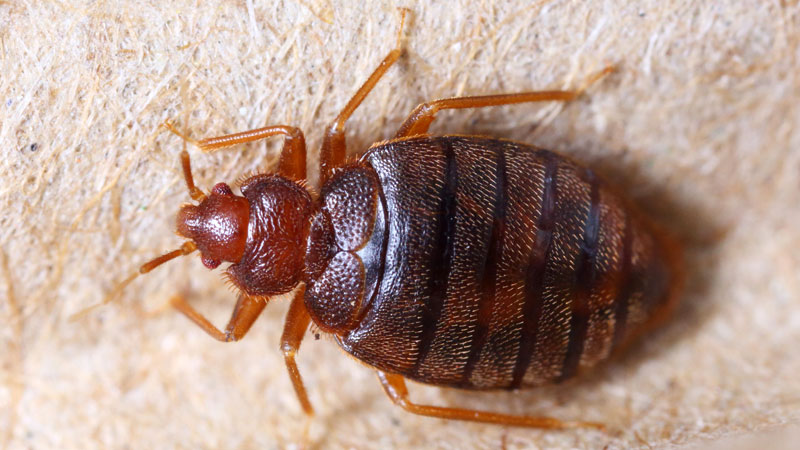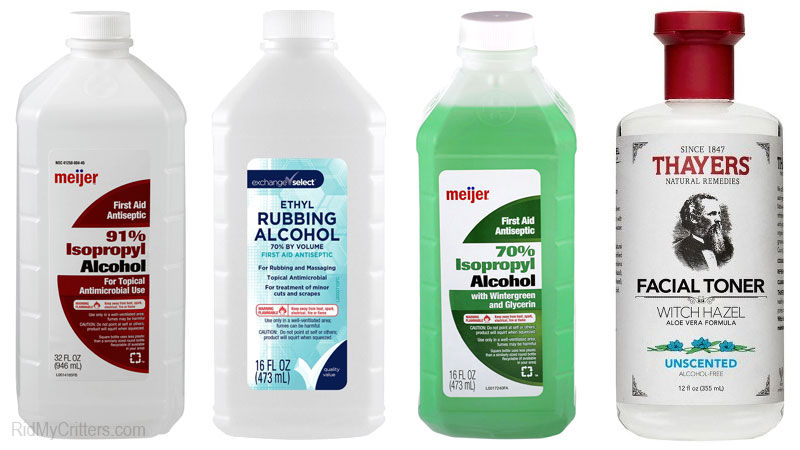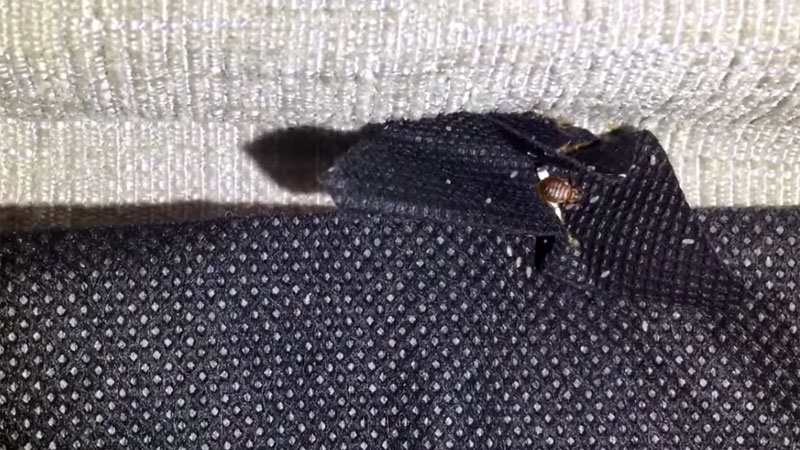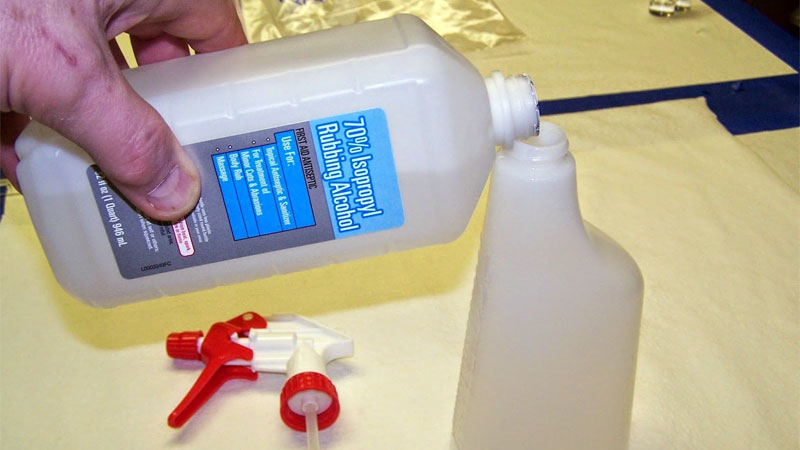An old and popular home remedy, rubbing alcohol and its siblings have long been used in the fight against all sorts of critters, including bed bugs. But are these methods really effective? It the popular belief that rubbing alcohol kills bed bugs true? Or is it just a myth?
Research has shown very grey results. Let’s take a moment and look at the strengths and weaknesses of these products. As always, be aware your experience may vary with any home remedy.
Related: 11 Bugs Commonly Mistaken for Bed Bugs
The Four Big Bad “Alcohols”
There are four major contenders to consider here, one of which is rubbing alcohol. You may have mistakenly used some of these interchangeably, but they’re all rather different.
Knowing the differences will help shed more light on why these do (and do not) work as bed bug remedies.
1. Isopropyl Alcohol
Known in scientific circles as 2-propanol, isopropyl is a secondary alcohol. It oxidizes to create acetone and works well as a solvent and an ingredient for creating other chemicals.
2. Rubbing Alcohol
Made of 70-95 percent ethanol and additives, this denatured alcohol is highly poisonous if consumed. However, rubbing alcohol works great as a wound or surgical tool disinfectant.
Read Also: Do Bed Bugs Drown in Water?
3. Wintergreen Alcohol
This mix generally consists of 50 percent isopropyl alcohol with several additives, including menthol or methyl salicylate. Isopropyl alcohol with wintergreen is used most often as a muscle rub due to its pleasant smell and cooling effect.
4. Witch Hazel
A natural tree extract, witch hazel is a mild astringent that has all sorts of health benefits. Groomers often use it to clean up blood from a cut quick, since witch hazel won’t discolor fabrics or carpets.
See Also: Does Rubbing Alcohol Kills Fleas?
Ranking the Four Alcohols
Before you rush to pick up a random alcohol for bed bugs, it’s important to understand that these four aren’t equal in potency. Rubbing alcohol in concentrations above 90 percent will generally be the most potent. Isopropyl is second most powerful.
Wintergreen isn’t effective against bed bugs, so we won’t be discussing it further. However, while witch hazel is a poor treatment for bed bugs directly, it has other uses related to this critter that we’ll discuss later.
How Do Bed Bugs React to Alcohol?
Depending upon the type, alcohol may serve as a repellent or even kill bed bugs on contact when saturated. Of the four, witch hazel is the weakest and not good for extermination purposes. However, its ability to clean up blood can be a good way to make your bed a little less attractive if you had a cut or other wound.
The rest have varying degrees of success, but all have one thing in common: the effects rely on direct contact or repelling through their odor.
Can Alcohol Kill Bed Bugs Instantly?
Unfortunately, no. Spraying bed bugs or their eggs directly with wintergreen alcohol will break down the cell walls, resulting in death, but the alcohol will dry too quickly to use as a one-stop solution.
Rubbing alcohol will last a little longer than wintergreen but has the same poor results. Spraying on the bed before going to sleep will help repel a bed bug but will have dried long before the pest touches the treated spot.
As for isopropyl, a high percentage mix works well against bed bugs but dries faster. Meanwhile, a lower percentage is slightly less effective but will dry slower. You should generally aim for 91 percent or better for both isopropyl and rubbing alcohol.
Related: What To Do When Exposed to Bed Bugs
Does Alcohol Kill Bed Bug Eggs?
Again, the answer depends on whether or not there’s direct contact, as well as the concentration. Using any type of alcohol requires direct contact to affect the eggs and thus has no effect on eggs hidden away.
As eggs can take a few days to hatch, you’ll need to reapply the alcohol spray every few days for a couple weeks to get the best results. Spraying will involve the headboard, mattress, box spring, and as many crevasses as possible.
Changing the bed sheets daily and running them through a dryer on its highest heat setting may also help against fertile adult bed bugs so fewer new eggs get laid.
Witch Hazel and Bug Bites
While there’s some evidence to suggest witch hazel can kill bed bugs, there’s no hard proof. However, the active ingredient of witch hazel (tannin) works wonders as a means to treat bed bug bites.
Tannin causes the tissue around the bite to shrink, reducing redness and eliminating the itching and pain. It also has a soothing effect similar to wintergreen alcohol.
Some evidence does suggest witch hazel can be used as a bed bug repellent, and a popular home remedy is to spray a mix of witch hazel and cinnamon oil anywhere the bed bug are present. You can also add tea tree oil or oregano essential oil for some additional firepower, as both have been found to repel bed bugs in higher concentrations.
Please note that the store-bought version of witch hazel is greatly diluted, so it won’t be very effective even as a repellent. Buy a stronger version online or through a medical outlet when planning to use it for this purpose.
See Also: 9 Effective Ways to Kill Dust Mites
Negative Effects of Using Alcohol
Using any form of alcohol on furniture comes with risks. Keep in mind rubbing alcohol and isopropyl are both used as solvents, and isopropyl especially is good at stripping paint and varnish. They can also discolor fabrics.
Another issue is that the alcohol vapors are harmful. Thus, alcohol treatments should generally be reserved for well-ventilated areas.
Witch hazel is safe on finished surfaces but are a far less effective solution for bed bugs. Instead, this alternative should be reserved for cleaning purposes only.
Also note that since these products have a high alcohol content, they are increasingly flammable the higher the concentration. Thus, it’s best to avoid having any sort of flame in the room as long as the vapors remain.
Finally, alcohol can reduce the potency of any professional treatments, thus you’ll want to avoid using these products prior to an exterminator visit.
Related: Getting Rid of a Bed Bug Infestation in a Bedroom
Does Rubbing Alcohol Repel Bed Bugs?
Rubbing alcohol, like the other three, does repel bed bugs. However, this is a double-edged sword. Any bed bugs you fail to kill will spread to other locations throughout the house to get away from the smell, resulting in an even worse bedbug infestation.
You can help reduce this risk by applying Vaseline to the legs of your bed, making a sticky barrier the bugs can’t easily cross, as well as coating any place where the bed and headboard comes in contact with the walls or other objects.
Remember, rubbing alcohol can cause discoloration on upholstered furniture or ruin your bed sheets. Considering rubbing alcohol isn’t a very effective remedy against bed bugs and its repellent properties can backfire on you, it’s probably best to simply avoid using rubbing alcohol as a bed bug treatment altogether.
Related: How to Get Rid of Bed Worms
The Rutgers Verdict
In 2013, a research team at Rutgers University completed a study that tried several home remedies to find out how effective they were against bed bugs. When it came to rubbing alcohol, they found that approximately half of those directly sprayed were still alive four days later.
As a result, they deemed the use of alcohol to be one of the least effective ways to get rid of bed bugs. In terms of home remedies, however, it proved to be a decent DIY weapon overall when used as a means of population control.
So, You Ask, What Chemical Kills Bed Bugs Completely?
This is something that most sites (and even some experts) love to skirt around. The truth is, no chemical, be it household or industrial, is guaranteed to kill all bed bugs. Some are certainly more effective than others, but what works well on bed bug eggs may have less impact on adults or vice-versa.
We certainly recommend using home remedies over the cost of hiring an exterminator when they work, but be aware that even paying for a full extermination won’t eliminate every bed bug.
Natural remedies are also preferable because there’s less chance of creating super bugs (an insect capable of withstanding the harshest pesticides). That said, let’s end with a few basic tips to help keep those infestations down.
- When you discover an infestation, put all clothing and linen from that room into a tightly sealed bag. Treat these with a couple runs through a high-heat dryer.
- Steam clean your mattress, box springs, and carpeting.
- Spray your sheet with essential oils or blend of cinnamon oil and witch hazel at night to help keep the bed bugs away while you sleep.
- How to Get Rid of Hawks - March 8, 2024
- How to Get Rid of Pill Bugs (Rolly Pollies) - March 1, 2024
- How to Get Rid of Groundhogs (Woodchucks) - February 5, 2024





Rid lice spray was what I was told by the CDC and it worked for our problem make sure to cover everywhere all zippers and seams be relentless and ocd about it but 2 treatment for 1700 sqft house got it cleaned up
Also was told to draw a line in front of doors wit it where they can crawl under so I sprayed a foot wide path wide in front of the doors